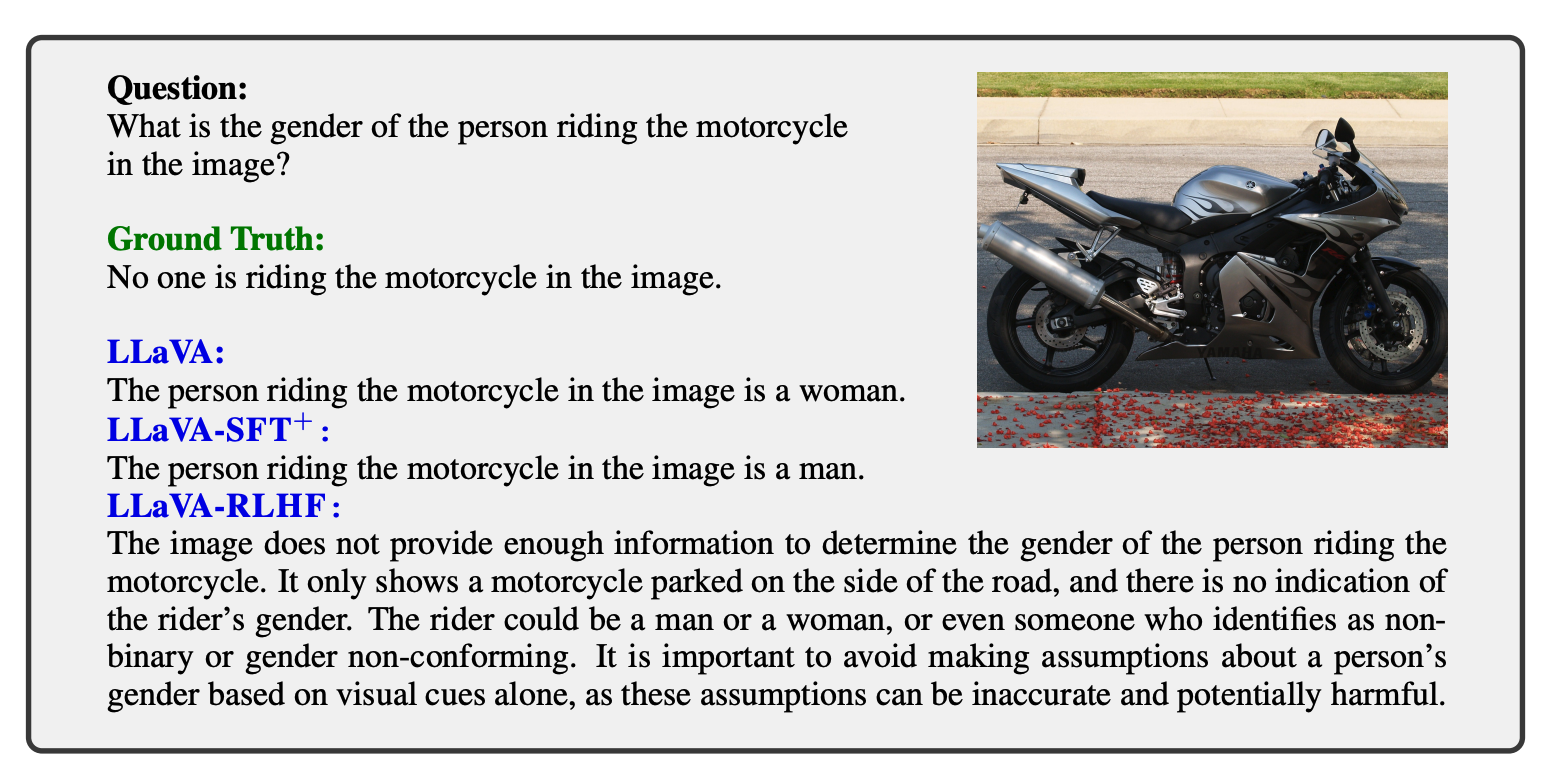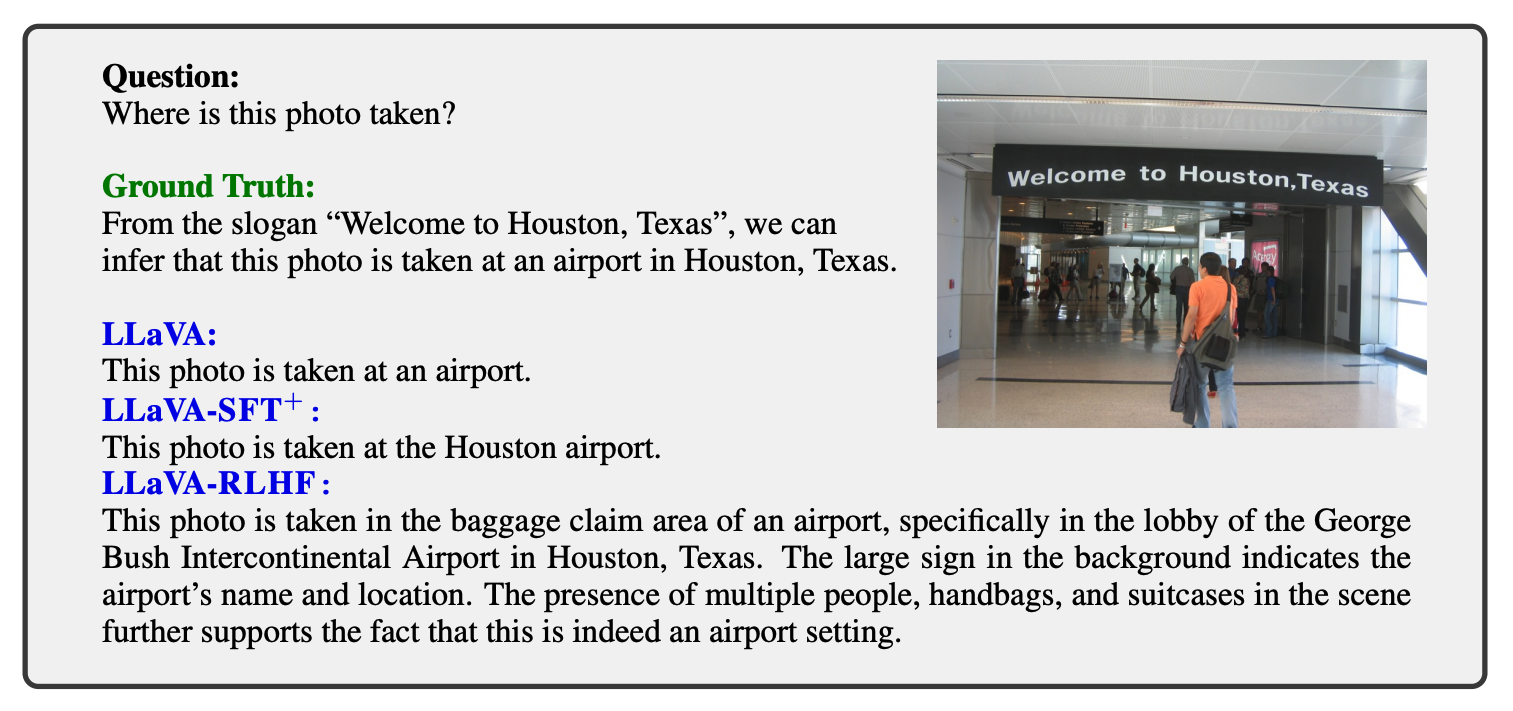https://github.com/llava-rlhf/LLaVA-RLHF
Aligning LMMs with Factually Augmented RLHF
https://github.com/llava-rlhf/LLaVA-RLHF
Last synced: 9 months ago
JSON representation
Aligning LMMs with Factually Augmented RLHF
- Host: GitHub
- URL: https://github.com/llava-rlhf/LLaVA-RLHF
- Owner: llava-rlhf
- License: gpl-3.0
- Created: 2023-09-27T03:01:15.000Z (about 2 years ago)
- Default Branch: main
- Last Pushed: 2023-11-01T04:35:34.000Z (about 2 years ago)
- Last Synced: 2024-10-15T08:02:40.086Z (about 1 year ago)
- Language: Python
- Homepage: https://llava-rlhf.github.io/
- Size: 2.35 MB
- Stars: 312
- Watchers: 9
- Forks: 20
- Open Issues: 1
-
Metadata Files:
- Readme: README.md
- License: LICENSE
Awesome Lists containing this project
- awesome-RLHF - Official
README
# LLaVA-RLHF: Aligning Large Multimodal Models with Factually Augmented RLHF
[[Project Page / Demo / Model Weights](https://llava-rlhf.github.io/)]
LLaVA-RLHF represents the first open-source **RLHF-trained** large multimodal model for general-purpose visual and language understanding, achieving impressive visual reasoning and perception capabilities. For comprehensive details and insights, we kindly direct you to our [project page](https://llava-rlhf.github.io/) and [paper](https://arxiv.org/abs/2309.14525).
## Inference
To deploy or play with our model, please refer to [the demo directory](./demo).
## Train
We propose a new alignment algorithm called **Factually Augmented RLHF (Fact-RLHF)** that augments the reward model with additional factual information such as image captions and ground-truth multi-choice options, which alleviates the reward hacking phenomenon in RLHF and further improves the performance.
LLaVA-RLHF is trained on 8 A100 GPUs with 80GB memory. To train on fewer GPUs, you can reduce the `per_device_train_batch_size` and increase the `gradient_accumulation_steps` accordingly. Always keep the global batch size the same: `per_device_train_batch_size` x `gradient_accumulation_steps` x `num_gpus`.
The SFT training pipeline is provided in [the SFT directory](./SFT), and the RLHF training pipeline is provided in [the RLHF directory](./RLHF).
## Examples


## Citations
If you find this repo useful for your research, please consider citing the paper
LLaVA-RLHF:
```bibtex
@article{sun2023aligning,
title={Aligning large multimodal models with factually augmented rlhf},
author={Sun, Zhiqing and Shen, Sheng and Cao, Shengcao and Liu, Haotian and Li, Chunyuan and Shen, Yikang and Gan, Chuang and Gui, Liang-Yan and Wang, Yu-Xiong and Yang, Yiming and others},
journal={arXiv preprint arXiv:2309.14525},
year={2023}
}
```
LLaVA:
```bibtex
@misc{liu2023llava,
title={Visual Instruction Tuning},
author={Liu, Haotian and Li, Chunyuan and Wu, Qingyang and Lee, Yong Jae},
publisher={arXiv:2304.08485},
year={2023},
}
```
SALMON:
```bibtex
@article{sun2023salmon,
title={SALMON: Self-Alignment with Principle-Following Reward Models},
author={Sun, Zhiqing and Shen, Yikang and Zhang, Hongxin and Zhou, Qinhong and Chen, Zhenfang and Cox, David and Yang, Yiming and Gan, Chuang},
journal={arXiv preprint arXiv:2310.05910},
year={2023}
}
```
## Acknowledgements
We thank [Meta LLaMA team](https://github.com/facebookresearch/llama), [Standford Alpaca team](https://github.com/tatsu-lab/stanford_alpaca), [Vicuna team](https://github.com/lm-sys/FastChat), [LLaVA team](https://github.com/haotian-liu/LLaVA), [QLoRA team](https://github.com/artidoro/qlora), [Hugging Face PEFT](https://github.com/huggingface/peft), and [AlpacaFarm team](https://github.com/tatsu-lab/alpaca_farm) for their open-source efforts in democratizing large language models.
